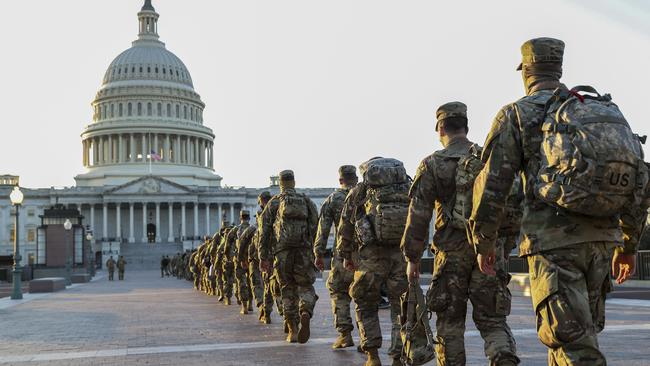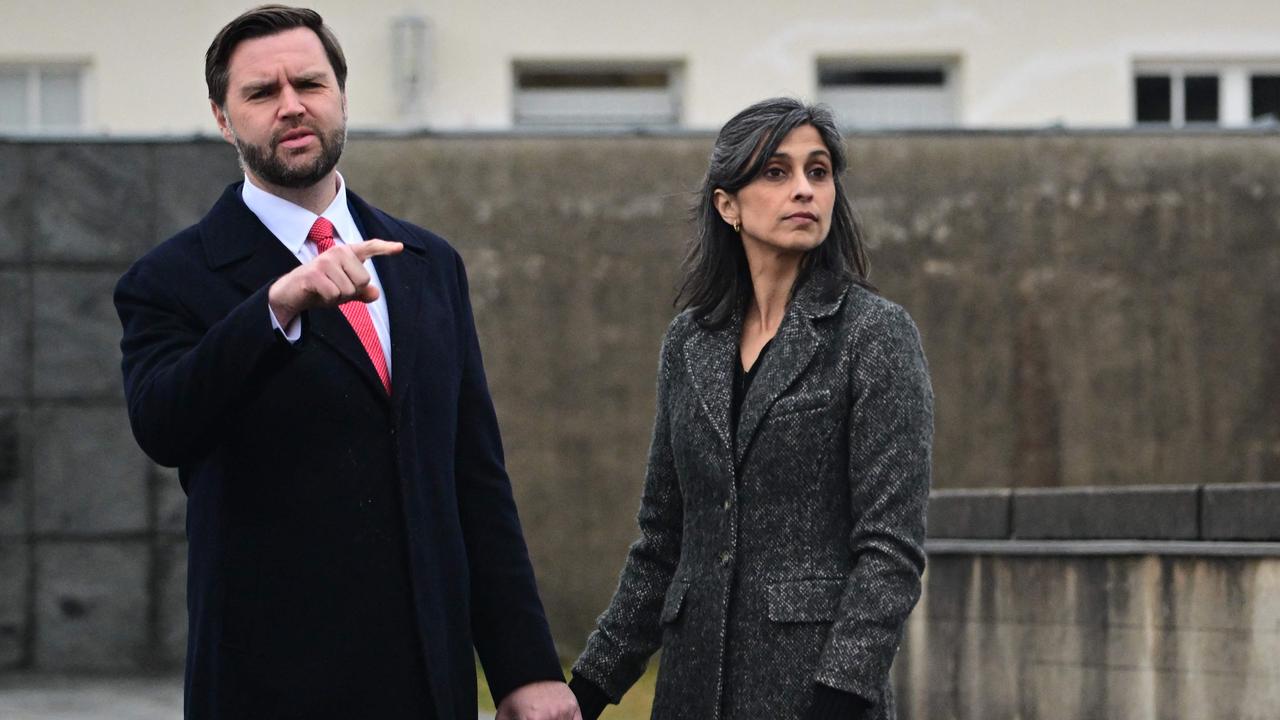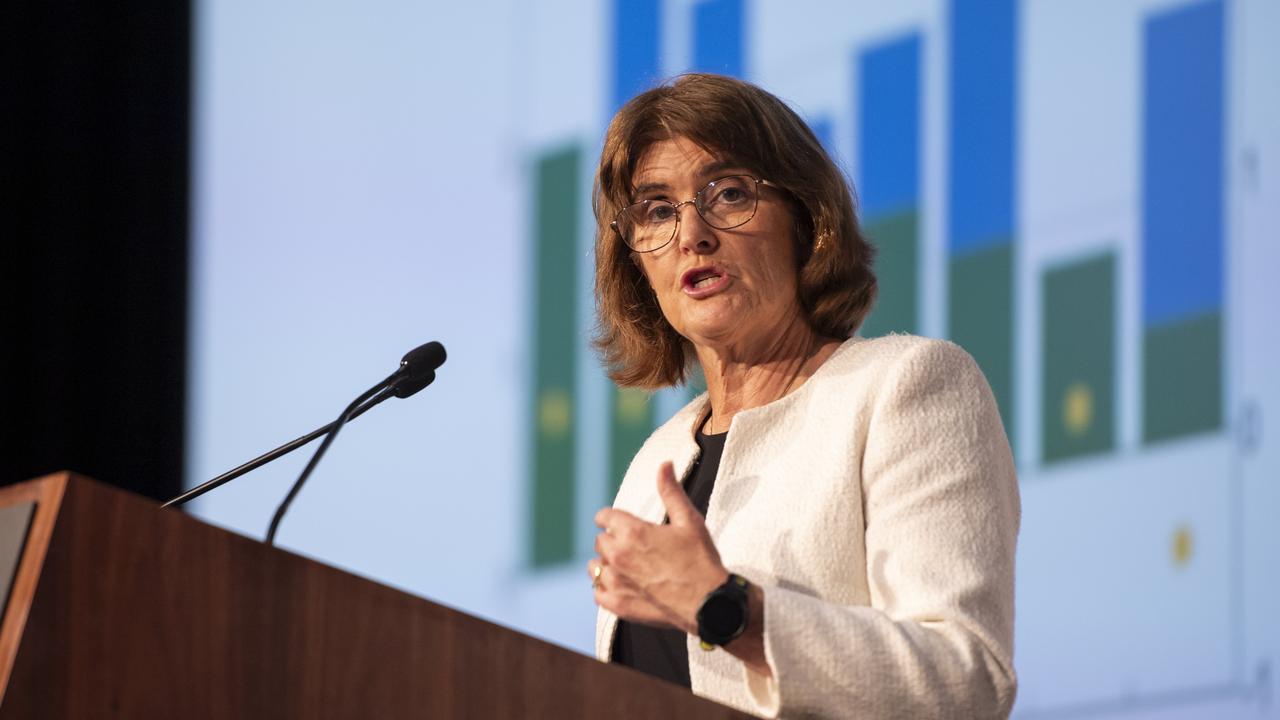FBI has opened over 160 cases tied to pro-Trump Capitol riot
Prosecutors look at sedition charges over the storming of the US Capitol, which military leaders call an assault on the constitution.

America’s military leadership has denounced last week’s storming of the US Capitol by a pro-Trump mob as a plot to overthrow the government, while federal prosecutors said they were examining more than 160 cases and weighing sedition charges in some of them.
The resolute stance from the country’s top military and law-enforcement institutions comes as Washington grapples with continuing security concerns and threats of violence centred around next week’s inauguration of president-elect Joe Biden, a Democrat. The overrunning of the Capitol drew widening criticism from politicians and others, who said federal authorities weren’t prepared for the possibility of violence last week.
The Tuesday (Wednesday AEDT) statement from the Joint Chiefs of Staff and the heads of the branches of the US military called the January 6 assault, in which a violent, pro-Trump mob forcibly entered the Capitol where politicians were certifying Mr Biden’s presidential victory, “a direct assault on the U.S. Congress, the Capitol building, and our constitutional process.”
The statement also knocked back unfounded claims of some Republican politicians and Trump supporters that he was the election’s actual winner, an unusual situation for a military that typically steers clear of domestic politics.
“On January 20, 2021, in accordance with the Constitution, confirmed by the states and courts, and certified by Congress, president-elect Biden will be inaugurated and will become our 46th commander-in-chief,” said the statement, signed by the Joint Chiefs chairman, Army Gen. Mark Milley, and the commanders of the Navy, Marine Corps, Air Force, National Guard and Space Force.
Mr Trump didn’t acknowledge Mr Biden’s victory until late last week and had encouraged his supporters to march on the Capitol.
Also on Tuesday, the top federal prosecutor in Washington stressed the unprecedented nature of the sprawling investigation now under way into whether rioters were part of well-organised groups that planned Wednesday’s deadly attack.
Michael Sherwin, the acting US attorney in Washington, said his office had established a team of senior national-security and public-corruption prosecutors to examine the most serious cases, including the use of explosives and attacks on police officers.
“Their only marching orders from me are to build sedition and conspiracy charges related to the most heinous acts that occurred in the Capitol,” he said at a news conference on Tuesday. “We’re looking at and treating this just like a significant international counter-terrorism or counterintelligence operation.”
The FBI has opened more than 160 case files to date, said Steven D’Antuono, the assistant director in charge of the agency’s Washington field office. The bureau has received more than 100,000 videos and other forms of digital media related to the attacks that it is combing through for investigative leads, Mr D’Antuono said. A police officer and a rioter were killed in the rampage and three others died of medical emergencies.
“Even if you left DC, agents from our local field offices will be knocking on your door if we find out that you were part of the criminal activity at the Capitol,” Mr D’Antuono said. Federal prosecutors have filed charges against at least two dozen members of the mob — including the son of a Brooklyn judge and a military veteran who brought plastic zip-tie restraints with him to the Capitol — on charges ranging from gun crimes to assault and theft.
The new details came as law enforcement agencies scrutinise their response to the events of January 6 and their planning for demonstrations that have been called for next Sunday and inauguration day.
Information had been shared ahead of last week’s protests by an FBI office in Virginia, warning of the possibility that extremists were travelling to Washington beginning on January 6 to commit violence, people familiar with the document said. The information was based on threats posted on an online message board and was shared with other federal and state law-enforcement agencies within an hour of the FBI’s Washington office receiving it, Mr. D’Antuono said.
“We have to separate the aspirational from the intentional and determine which of the individuals saying despicable things on the internet are just practising keyboard bravado, or if they actually have the intent to do harm,” he said. But despite jarring language, he added, investigators were unable to link the threats to specific people they could pursue in advance.
The disclosures came as the same officials from the FBI and Justice Department gave politicians their first formal briefings on the riot, some six days after the carnage.
“We have grave concerns about ongoing and violent threats to our democracy,” the Democratic Party leaders of several house committees said in a statement after the briefing. “It is clear that more must be done to pre-empt, penetrate, and prevent deadly and seditious assaults by domestic violent extremists in the days ahead.”
Mr Sherwin and Mr D’Antuono have been law enforcement’s public face in the week since the attack, as Acting Attorney-General Jeffrey Rosen and FBI Director Christopher Wray have kept strikingly low public profiles.
Mr Wray on Monday night spoke to the top Democrat and Republican in the House and Senate, an official said, to provide an update on the status of the investigation.
Mr Rosen and Mr Wray are known for their low-key personalities and have stayed out of the spotlight throughout most of their tenures. But some current and former Justice Department officials say their lack of visibility after the attack is notable and a public appearance would reassure observers of the investigation’s priority.
“If you’re talking about filling in gaps, providing information, soothing a troubled nation, that should come from leaders,” said Chuck Rosenberg, a former top Justice Department official in both Republican and Democratic administrations. “The attorney-general has an obligation to speak to the nation if no one else is.”
Accounts from inside the Capitol and elsewhere describe a disjointed response in which senior aides to congressional leadership frantically called current and former Justice Department officials seeking immediate help as the rioters stormed the building and barged into some politicians’ offices.
One senior aide to Senate Majority Leader Mitch McConnell turned to former attorney-general William Barr’s chief of staff, Will Levi, who left the Justice Department in early December, seeking reinforcements for the badly outnumbered Capitol Police force. Mr Levi responded swiftly, first connecting the aide with department officials and then calling FBI Deputy Director David Bowdich for an urgent response, according to people familiar with the conversation.
Mr Bowdich, inside a command post at the FBI’s Washington Field Office, decided he couldn’t wait for a formal invitation from Capitol Police to send backup and mobilised bureau tactical teams, said the people familiar with the call, which the Washington Post reported earlier.
Mr Bowdich is a longtime FBI official well-versed in handling terrorist attacks and other high-profile cases, while Mr. Wray has spent more time as a corporate lawyer than a Justice Department official in a post- 9/11 world.
A senior FBI official said Mr Wray, despite a limited public presence, was routinely briefed about the bureau’s plans ahead of the protest and made at least two lengthy visits to the command centre at headquarters to monitor the unfolding situation. He was regularly in touch with Mr Bowdich and others, the official said.
“There is a challenge with [going public] because there is an ongoing investigation,” said Joshua Skule, a former senior FBI official who ran the agency’s intelligence branch until 2019 and is now senior vice-president for the risk advisory firm Allied Universal.
For his part, Mr Rosen, a longtime civil litigator, has leaned heavily on his acting deputy, Richard Donoghue, for advice on criminal matters, people familiar with the department’s upper ranks said.
Leadership has been in transition across Washington as Trump administration officials have departed ahead of Mr Biden’s inauguration, including Mr Barr, who left late last month. The transitions complicated the response to the riot.
Both Mr Wray and Mr Rosen have at times over the past year been concerned about making public statements that could put Mr Wray in the crosshairs of Mr Trump, people familiar with the matter said. The president has publicly and privately threatened to fire his FBI director over the course of the past year.
Since assuming his role less than three weeks ago, Mr Rosen hasn’t made any moves to support Mr Trump’s allegations of election fraud. Late last month, the Justice Department also worked with Vice-President Mike Pence to reject a Republican congressman’s long-shot bid to give Mr Pence the power to overturn Mr. Biden’s victory.
The Joint Chiefs’ statement stressed the rule of law. “As service members, we must embody the values and ideals of the nation,” the top military officials wrote. “We support and defend the Constitution. Any act to disrupt the constitutional process is not only against our traditions, values and oath; it is against the law.”
Separately, a US Army spokeswoman said Tuesday military officials are working with federal authorities to identify any participants in last week’s attack at the Capitol who may have had a connection to the army.
At least one active-duty soldier and several retired service members are under investigation for possible involvement in the assault, defence officials said, adding that number likely will increase. Any active-duty service member involved could face either federal charges or prosecution under the Uniform Code of Military Justice.
The spokeswoman also said the Army and U.S. Secret Service are assessing whether National Guard members slated to be at next week’s inauguration will be required to undergo security screening, in a reminder to troops about political activity.
“There is no place for extremism in the military and we will investigate each report individually and take appropriate action,” the spokeswoman said.
The Defence Department has authorised as many as 15,000 National Guard members to be deployed to DC leading up to Wednesday’s inauguration.
Representatives from the agencies tasked with securing Washington through Wednesday’s inauguration met Tuesday afternoon, a US official said. Attendees included officials from Park Police, the Secret Service, Metropolitan Police, the National Guard and Capitol Police. Such co-ordination didn’t happen ahead of January 6, the official said. Tuesday’s meeting was a result of the communication problems that plagued the various agencies’ response to the storming of the Capitol.
The US Secret Service is in charge of security in Washington through January 20, the official said.
The Wall Street Journal


